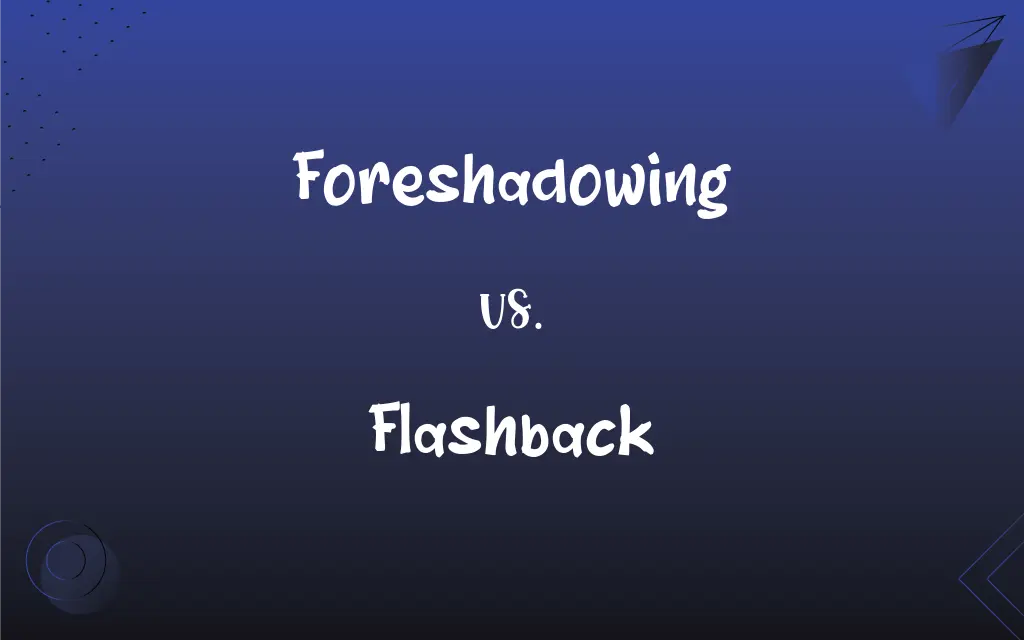Foreshadowing vs. Flashback: What's the Difference?
Edited by Janet White || By Harlon Moss || Updated on October 24, 2023
Foreshadowing hints at future events, while a flashback revisits past events.

Key Differences
Foreshadowing is a literary device that offers hints or clues about what will happen later in the story. This technique builds anticipation in the reader's mind, setting expectations for future events. Flashback, on the other hand, takes the narrative back in time, revealing events that have already occurred.
Foreshadowing's primary purpose is to create suspense or prepare the audience for upcoming events. It can be subtle or direct, but it always hints at something that will occur later. Flashback serves to provide context or background information, helping readers or viewers understand the present actions of characters based on their past experiences.
The placement of foreshadowing occurs before the event it hints at. For instance, a character might express fear of the sea, suggesting a future maritime disaster. Flashback, in contrast, interrupts the current timeline to transport the audience to a previous moment, such as showing the same character's traumatic childhood experience at the beach.
In essence, foreshadowing and flashback are tools writers use to enhance the depth and structure of a narrative. While foreshadowing sets the stage for things to come, creating intrigue, flashback adds layers to the storyline by unveiling character backgrounds and motivations.
Comparison Chart
Function
Hints or suggests future events.
Revisits past events.
ADVERTISEMENT
Purpose
Build suspense or set expectations.
Provide context or background information.
Placement
Before the hinted event.
Interrupts the current timeline.
Effect on Timeline
Does not alter the story's chronological order.
Transports the narrative to a previous time.
Narrative Role
Creates anticipation.
Offers depth and backstory.
Foreshadowing and Flashback Definitions
Foreshadowing
It's a tool to build suspense in a narrative.
The howling wind and dark clouds foreshadowed the storm that was coming.
ADVERTISEMENT
Flashback
Flashback provides backstory or context to the present storyline.
Through a flashback, we learned of the antagonist's traumatic past.
Foreshadowing
Foreshadowing subtly suggests upcoming plot developments.
The character's constant coughing foreshadowed a later illness.
Flashback
It offers insight into characters' motivations based on past experiences.
The flashback revealed the reason behind the hero's fear of water.
Foreshadowing
It sets the stage for later events in a story.
The gun on the wall in the first act foreshadowed its use in the third act.
Flashback
A flashback transports the narrative to an earlier event.
The protagonist had a flashback to his childhood days spent in the countryside.
Foreshadowing
Foreshadowing gives advance hints about future events.
The broken mirror in the hallway foreshadowed bad luck for the protagonist.
Flashback
Flashback uncovers past events influencing the current plot.
The film used a flashback to show the protagonist's first love.
Foreshadowing
Foreshadowing preps readers for anticipated outcomes.
The dream about falling foreshadowed the character's eventual downfall.
Flashback
It interrupts the current events to showcase a past moment.
During the trial, she had a flashback to the night of the crime.
Foreshadowing
To present an indication or a suggestion of beforehand; presage
Hostilities that foreshadowed all-out war.
Flashback
A literary or cinematic device in which an earlier event is inserted into the normal chronological order of a narrative.
FAQs
Why do authors use flashback?
Authors use flashback to provide context, background information, or reveal character motivations.
Is flashback used only in literature?
No, flashback is also common in films, television shows, and other forms of storytelling.
What does a flashback depict?
A flashback revisits and showcases past events within a narrative.
Can foreshadowing be direct?
Yes, foreshadowing can be both subtle or direct, depending on the writer's intention.
Why is foreshadowing important in storytelling?
Foreshadowing adds layers of meaning, creates suspense, and prepares readers for future events.
What is foreshadowing?
Foreshadowing is a literary device that provides hints about future events in a story.
How is foreshadowing different from prediction?
While both involve future events, foreshadowing is a narrative technique, whereas prediction is an audience's guess.
Can a story have multiple flashbacks?
Yes, stories can incorporate multiple flashbacks to revisit various moments from the past.
How does foreshadowing affect reader's experience?
Foreshadowing builds suspense and sets expectations, heightening the reader's anticipation.
Can foreshadowing be unintentional?
In well-crafted works, foreshadowing is intentional, but ambiguous elements might inadvertently foreshadow events.
What's the primary difference between foreshadowing and flashback?
Foreshadowing hints at future events, while flashback revisits past events.
How does flashback relate to character development?
Flashback can provide insights into a character's past, shaping their current behavior and motivations.
In what forms can flashback be presented?
Flashback can be presented through dreams, memories, or even entire sequences revisiting past events.
Does foreshadowing always indicate negative events?
No, foreshadowing can hint at both positive and negative future events.
Can foreshadowing be misleading?
Yes, sometimes authors use "red herrings" to deliberately mislead readers with false foreshadowing.
Are dream sequences considered flashbacks?
If a dream sequence revisits past events, it can be considered a form of flashback.
Can flashbacks be confusing?
If not clearly indicated or overused, flashbacks can potentially confuse the timeline for readers or viewers.
Can a flashback be lengthy?
Yes, flashbacks can be brief moments or extend for several chapters or scenes.
Does every story use foreshadowing?
No, while foreshadowing is common, it's not present in every story.
How do readers recognize foreshadowing?
Readers might recognize foreshadowing through hints, symbols, or direct statements indicating future events.
About Author
Written by
Harlon MossHarlon is a seasoned quality moderator and accomplished content writer for Difference Wiki. An alumnus of the prestigious University of California, he earned his degree in Computer Science. Leveraging his academic background, Harlon brings a meticulous and informed perspective to his work, ensuring content accuracy and excellence.
Edited by
Janet WhiteJanet White has been an esteemed writer and blogger for Difference Wiki. Holding a Master's degree in Science and Medical Journalism from the prestigious Boston University, she has consistently demonstrated her expertise and passion for her field. When she's not immersed in her work, Janet relishes her time exercising, delving into a good book, and cherishing moments with friends and family.































































